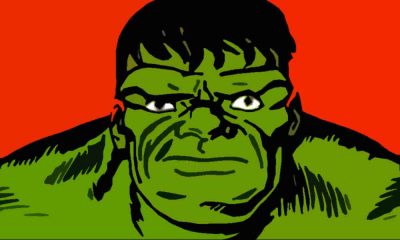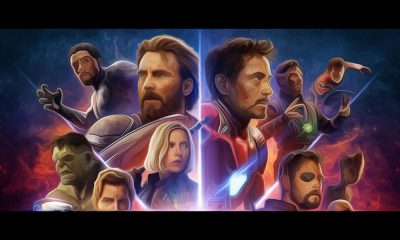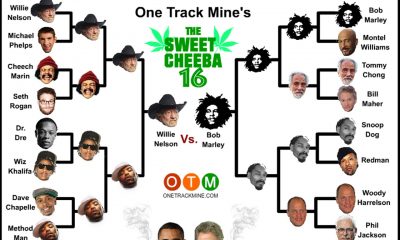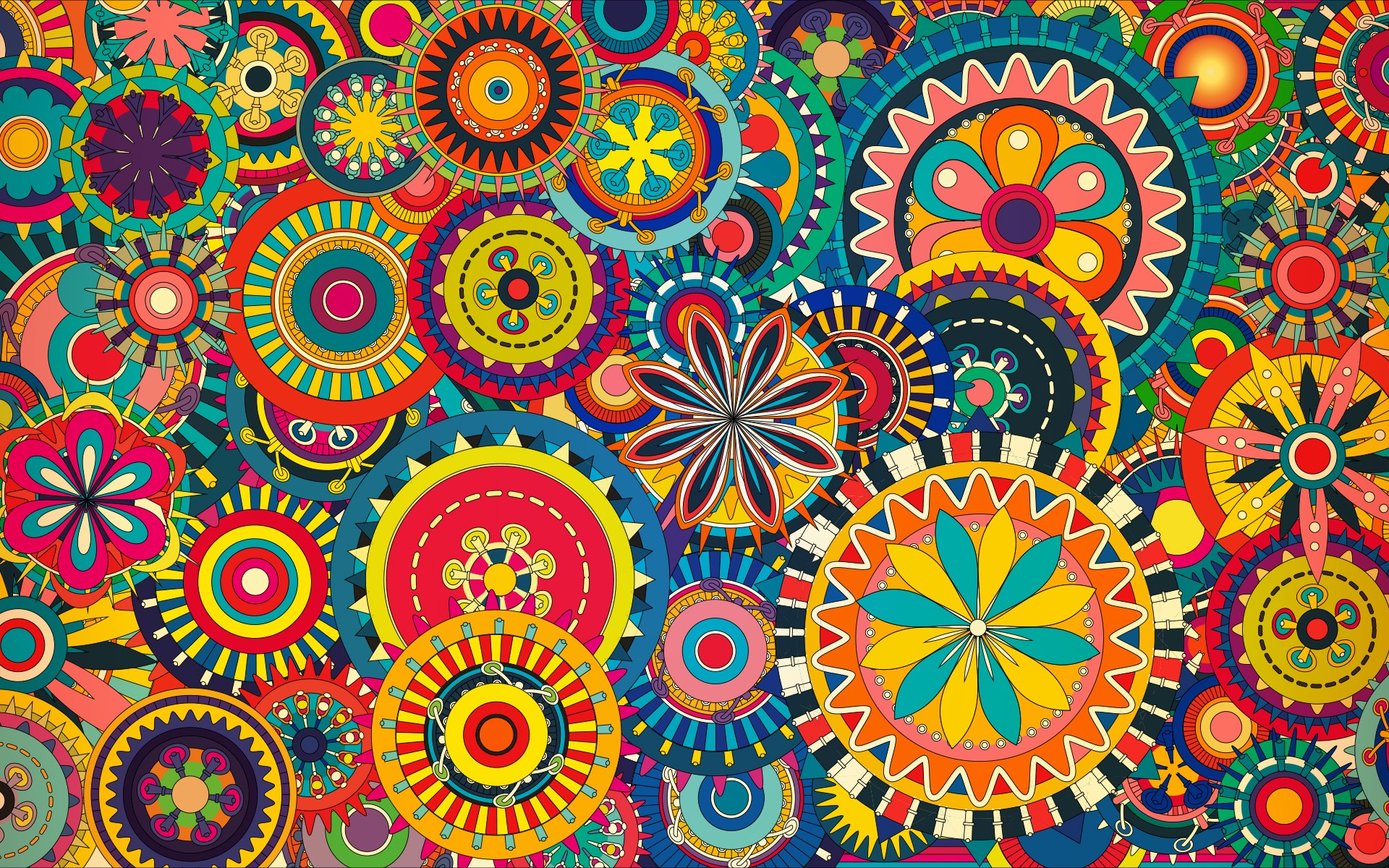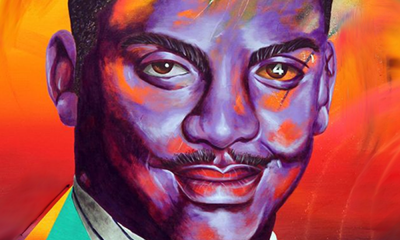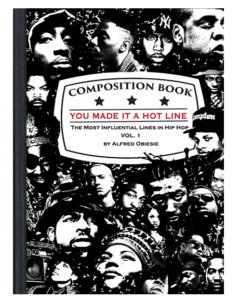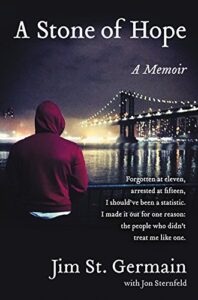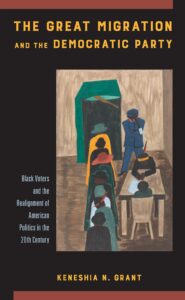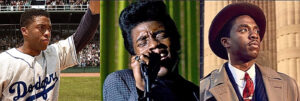Entertainment
First Comes Self, Then Comes Marriage
Published
11 years agoon
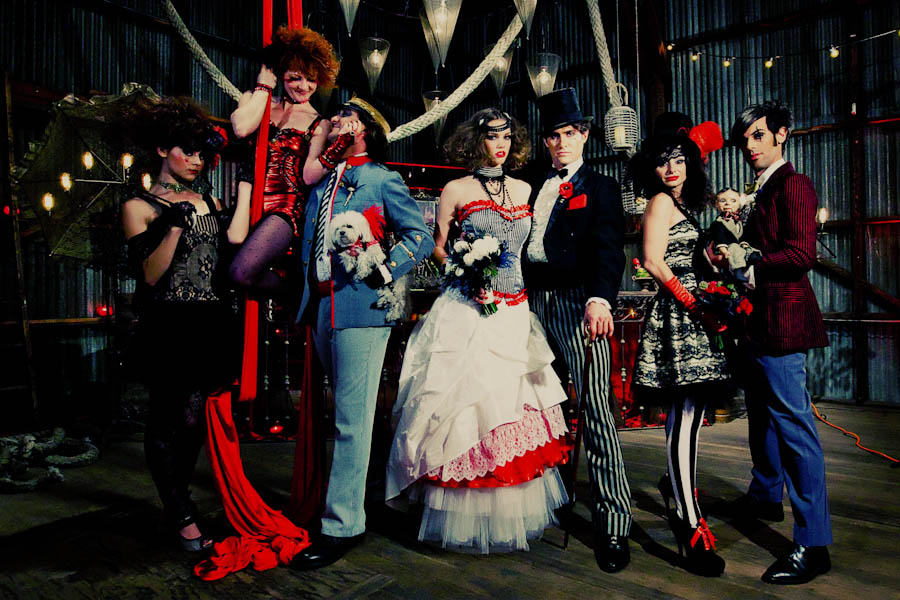
So after recently being thrown out of a lady friend’s apartment for asking if she ever considered that she may never get married, I quickly came to the realization that I too may share the same fate. My question to her was hypothetical but firmly grounded in my own beliefs. Couple that with her recent termination of an engagement and one can ascertain that the timing of my inquiry may have been a bit premature (in my defense, I did ask her if she was comfortable talking about this and I only inquired after she brought it up). Now I could easily dismiss her behavior as rash, and it in fact was, but this would not be the first time my questioning of marriage garnered emotional backlash.
My questioning of marriage is not because I don’t love love or the idea of having a life long partner. I am after all a hopeless romantic (although fleeting) and a passionate idealist (also fleeting). It is also not because I am a commitment-phobic man whore fueled by copulatory pleasures with multiple partners. Deuce Bigelow-esque behavior can be enjoyable but also taxing once the emotional scales become unbalanced (I like to have sex with you, but not in that way). My gripe is mainly because I cannot find anyone who feels the same way about marriage as I. Once I identify that individual who believes marital practices are complete and utter bullshit but wants to go through with it anyway, I am off to Harry Winston post haste for this magical beast is indeed my true love!
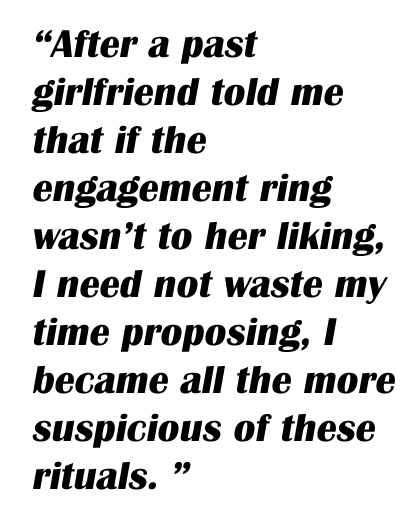 My perspective may not be the norm and certainly does not mirror popular consensus, although the growing # of divorces may refute that. Marriage to me is a status driven practice predicated on the literal (update to emotional) possession of another individual, typically the woman. At point of origin, women were often used as currency to pay off wealthy land owners or as bargaining chips to attain a higher social status. Funny how Women are now the main proponents (I need that marketing strategy so I can persuade my employers on the benefits of paying me not to work).
My perspective may not be the norm and certainly does not mirror popular consensus, although the growing # of divorces may refute that. Marriage to me is a status driven practice predicated on the literal (update to emotional) possession of another individual, typically the woman. At point of origin, women were often used as currency to pay off wealthy land owners or as bargaining chips to attain a higher social status. Funny how Women are now the main proponents (I need that marketing strategy so I can persuade my employers on the benefits of paying me not to work).
And don’t even get me started on the best man (named so because he was the most adept with a sword and capable of fending off individuals audacious enough to try and reclaim their kidnapped daughters). Most people are not abreast of the history of marriage, nor do they care to find out but most will adhere to its practices (is this not the very definition of ignorance?) After a past girlfriend told me that if the engagement ring wasn’t to her liking, I need not waste my time proposing, I became all the more suspicious of these rituals. As I am innately contrarian and mildly self righteous, I have always been leery of any readily accepted norm. Posing questions come as naturally to me as an overweight person’s desire for extra cheese on their ham flavored Kool- Aid.
I often hear women say being married makes you want to work out your problems because you can’t just walk away. Counterpoint 1); Men have a problem being contractually obligated to love and 2) why the hell can’t I leave if I no longer want to be involved? As an idealist (see paragraph 2), should my desire to remain in said relationship not be fueled by my own volition? We can all be fickle but staying in a relationship simply because it would be too messy to dissolve is about as healthy as starving to death because cooking is just too cumbersome. If we have come to an end pass, and differences become irreconcilable, why should public humiliation and fear of losing half my possessions be my motivation to further progress unhappiness? And although I have no possessions worthy of divorce court litigation, I am protective of my future assets yet to be acquired (preemptive strategies I picked up from the Bush administration).
Weddings these days somehow parallel Ringling Brothers triumphant return to Madison Square Garden. Monies spent, limos rented, tuxedos adorned and all in the name of what? So one can profess their undying love for someone who already knows they are loved? Or to validate a union in the eyes of a God who also already knows how you feel (as said deity should since said deity is responsible for all this). God, like Santa, also knows that you have been having premarital sex so why is it we conform to fragments of societal norms that benefit us but discount the rest? Once again, we want what we want and when we want it.
Folk seem to believe that after a certain age /subset of accomplishments, marriage is the next logical course on the road to perceived happiness. Personal development has absolutely taken a back seat to personal accomplishment and to be quite frank, I don’t believe focus on self was ever in the driver’s seat (sorry Tony Robbins). We are all in search of qualities in others we deem valuable but few are willing to accept those traits are lacking within us. The poverty stricken want to marry the affluent, the mentally ill desire the sane, the Shreks of the world want Charlize Theron, etc. . . . Those who find security in these desired attributes need not look to others for that is most often a temporary fix. Why not strive for personal affluence, peace of mind, and beauty if those are the values you hold in high regard? Has anyone considered the unrealistic expectations we place on our respective partners by asking them to complete us? Happiness (construct of your beliefs and user defined) can only be attained when you realize that you and you alone are responsible (SELF esteem I believe it’s called). Public declarations of love and admiration from and for others, albeit endearing, cannot and will never subsidize love of self.
If elected president (I didn’t even know I was running), I can personally minimize the divorce rate and all marital woes in America in 3 years (give or take a week). Firstly, we all undergo stringent requirements before being allowed to partake in nuptials. In order to be accepted into any reputable institution, one must first meet or exceed strict mandates. Why should marriage be any different? My marital perquisites would consist of;
- A thorough psychological evaluation
- A financial assessment by a trained professional validating fiscal acuity
- A spiritual adviser (or shaman if one is available) confirming a balanced chi
- A strength and conditioning coach to keep those gluts up to snuff
- Written affidavits’ from the parents or guardians certifying the worthiness of the opposing candidate (good luck on this one)
To ensure sustained qualifications, these evaluations are to be repeated annually. If you do not meet the requirements, you are cited on you first offense, separated on your second and back in the club by the last. Since we are all raised on a reward system, it seems foolish to believe that we can exist outside of that. If there are no consequences for under performing, there is no desire to measure up. Of course some of us are self motivators and kudos to you guys but the rest of us would all be at home scratching our asses if we were still being paid to do so (some of us still are and yes, my ass is itchy).
My overlying issue is the ease in which we gravitate to norms without question. I cannot convince myself to be with someone who does not question their actions at all points in time. It is quite cumbersome to be so self reflective but like any goal one designates worthwhile, obtaining happiness should be arduous! My unwillingness to accept popular perceptions is probably why I will pass away spouse free and end up donating all my belongings to charity. I don’t know what the Red Cross is gonna do with all that porn but someone will put it to good use.
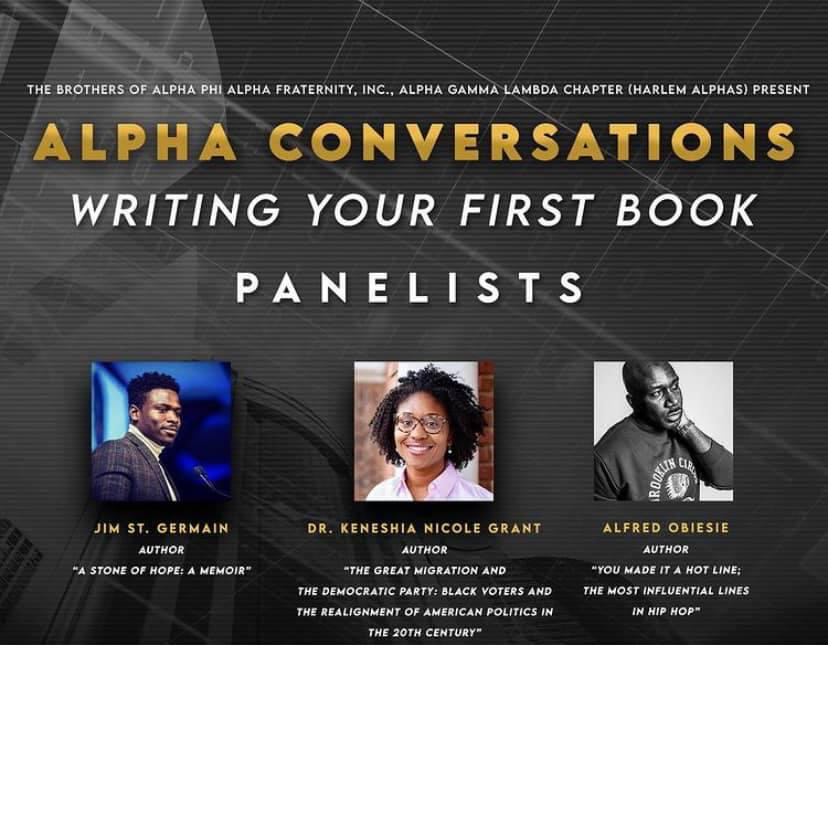
I had the distinct pleasure of participating in a panel discussion on writing your first book, presented by the Harlem chapter of Alpha Phi Alpha Fraternity Inc. Alongside Jim St. Germain, Author – A Stone of Hope: A Memoir and Dr. Keneshia Nicole Grant, Author – The Great Migration and the Democratic Party: Black Voters and the Realignment of American Politics in the 20th Century. We opined on pain points, benefits and strategies regarding our inaugural voyages into authorship. Feel free to watch for your self and I hope this provides some insight to all those looking to make the same voyage. Enjoy!
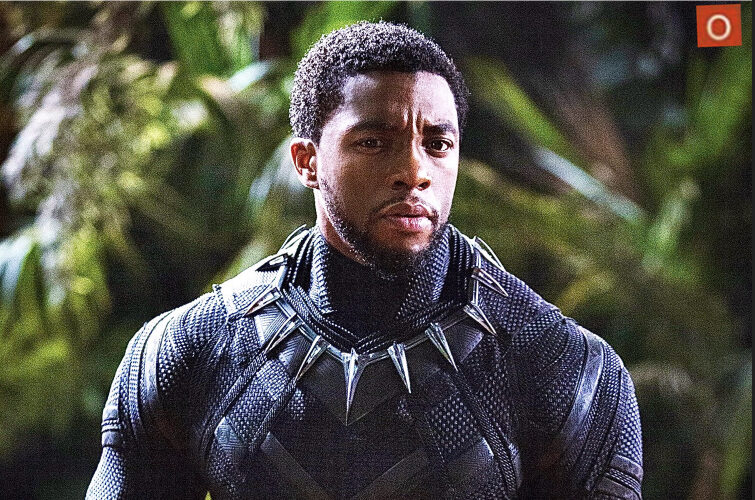
It is clear that Chadwick Boseman chose iconic roles like Thurgood Marshall, James Brown, Jackie Robinson and Black Panther with deliberate intent and for a specific purpose. In an age where positive roles for Black actors is often sparse, Chadwick managed to land and portray historical figures that made most respect his talents if not revel in his ability to transition effortlessly for one character to another. Even I had to give his African accent a solid B+ (It’s the highest grade the Nigerian Standards Bureau can give for an African accent to a non African FYI.)
Holding out and preparing for these dynamic roles came with both great frustration and incredible resolve I’m certain. Not to mention the taxing ordeal of battling Colon Cancer as the grueling scheduling of filming and increasing responsibility for positive representation loomed. Even under extreme duress, Chadwick’s commitment to others appeared to outweigh his own tribulations, unbeknownst to us all.
Black Panther may have been just a movie to some and that may be because some can easily rattle off 10 movies with a king of non Af-Am origin. It represented a lot more to others. Albeit imagined, imagery on cinema often accomplishes more to augment the social narrative and society itself than actual reality. If negative stereotypes influence perception then positive ones absolutely have the same converse effect.
Even in jest, the cultural misappropriation of raisins in potato salad on SNL skits directly spoke to the tampering of black culture to which T’challa championed, represented and aptly responded “Oh hell Nah Karen!”
If you don’t understand the relevance of representation, it’s probably because you are thoroughly represented. After all, no one is ever grateful for every breath they take until they are gasping for air.
R.I.P Chadwick Boseman. Thank you for breathing life into the possibility of Black excellence.
Article
10 Easter Eggs of Segregation in Lovecraft Country Episode 1
Published
5 years agoon
August 19, 2020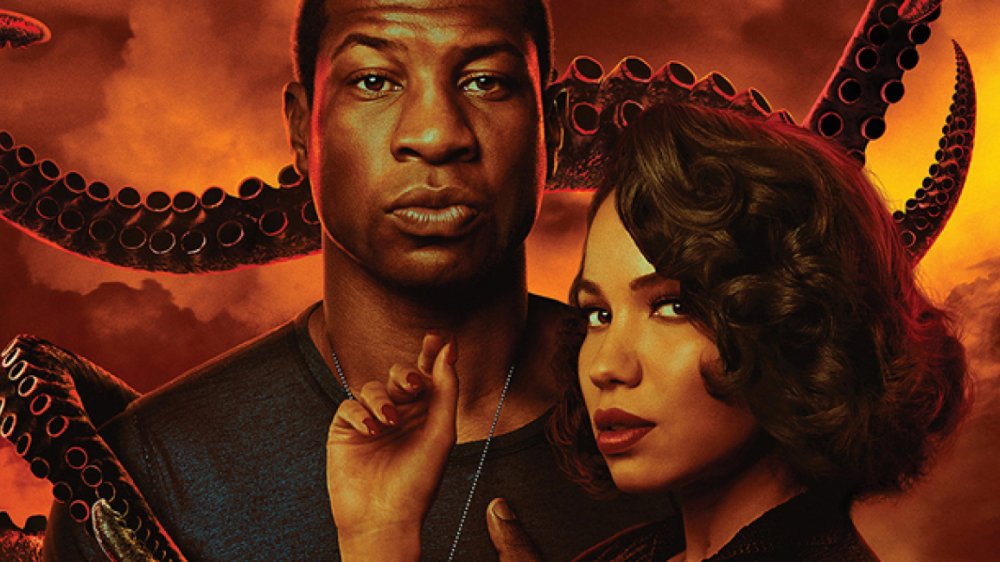
We’re all familiar with movies hiding easter eggs throughout their films sending winks and nods to pop-culture references. Sometimes it will be a tip-of-the-cap to an author, actor, or creator. Sometimes it is paying homage to an inspiring series, book, or film that’s near and dear to the director’s heart. This week I’ve seen a first. A T.V. series that has several easter eggs depicting segregation and oppression that only eagle-eyed aficionado’s of the black struggle might have caught on to.
Lovecraft Country is littered with important details that would fly over many people’s heads, and as I watched it again, I caught more nods to the true oppression of many African-Americans during the post-World War II era.
As a film buff, nothing makes me happier than watching a review, breakdown, or hidden easter egg video on a TV show I enjoy. Yesterday I did the same with Lovecraft Country, and while many of the melanin-deficient reviewers on youtube touched on the themes of literature, horror, and fantasy, many understandably missed some of the most important historical references.
Here are 10 Easter Eggs of Segregation in Lovecraft Country Episode 1.
1. H.P. Lovecraft’s little poem.
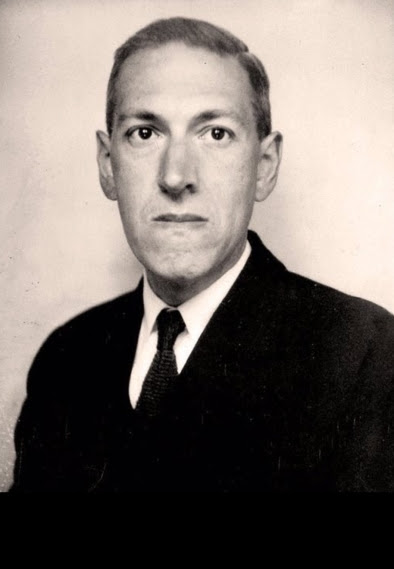
While we all know H.P. Lovecraft as an innovator of modern horror, fiction, and fantasy in literature, many people (including myself) didn’t know about a poem he wrote that spoke horribly about African Americans. Lovecraft Country alludes to the poem, but never recites it. Once they mentioned the title, I went straight to my Google Search. Below is the poem called: On the Creation of N*****s (1912)
When, long ago, the gods created Earth
In Jove’s fair image Man was shaped at birth.
The beasts for lesser parts were next designed;
Yet were they too remote from humankind.
To fill the gap, and join the rest to Man,
Th’Olympian host conceived a clever plan.
A beast they wrought, in semi-human figure,
Filled it with vice, and called the thing a N****r.
I’m sure Jackie Robinson beating the S**T out of Cthulhu at the beginning of the episode was a collective middle finger from the black community to Mr. Lovecraft.
2. Seating for Black People
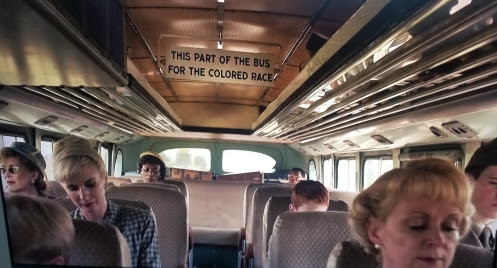
Scene from episode 1
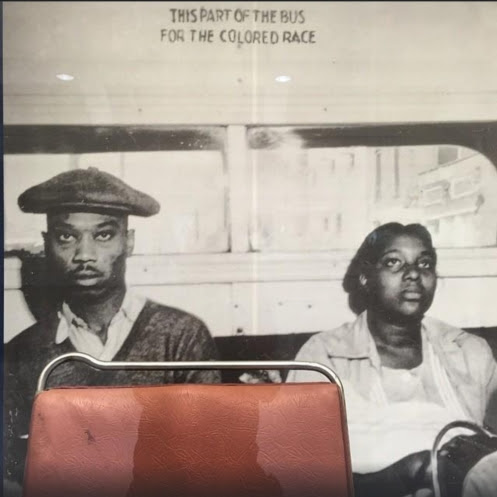
Actual photo of a segregated bus
While this may not come as a surprise to many of you, a lot of people are ignorant to the fact that, yes, black people were made to sit in the back of the bus. Many know the story of Rosa Parks’ defining moment, but for decades this was the way of life for black people. Where insult to injury is predicated in the show is when the bus breaks down and the bus driver gets a local pick-up truck driver to ride the stranded passengers into the city. Immediately in the next scene, the only two black passengers were seen walking down the road into Chicago.
3. Propaganda for the Negro Soldier
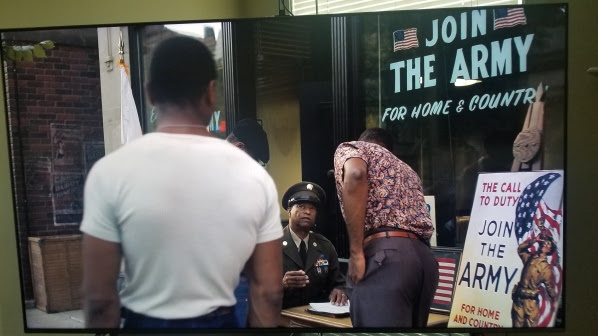

In Lovecraft Country, the above poster is not shown in this episode, but instead, it’s a black soldier telling other young black men that if they enlist, they can see the world. While Atticus walks by the soldier, there’s a glance of recognition as if Atticus was once one of those impressionable young men, and he knows their being lied to. Black men had to be enticed to enlist by different methods than whites because it was hard to show patriotism to a country that still to that day had kept them oppressed. So, they would show a poster of Joe Louis joining the fight…why don’t you? Get to see the world! Little did they know seeing the world would involve PTSD, death, and despair.
4. The Negro Motorist Greenbook
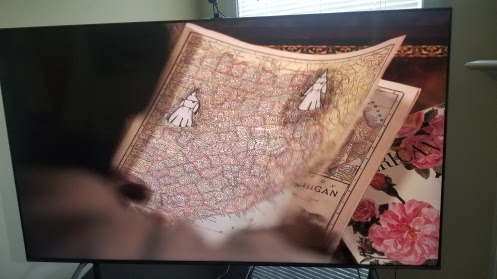
Scene from episode 1 depiction of the Green-Book
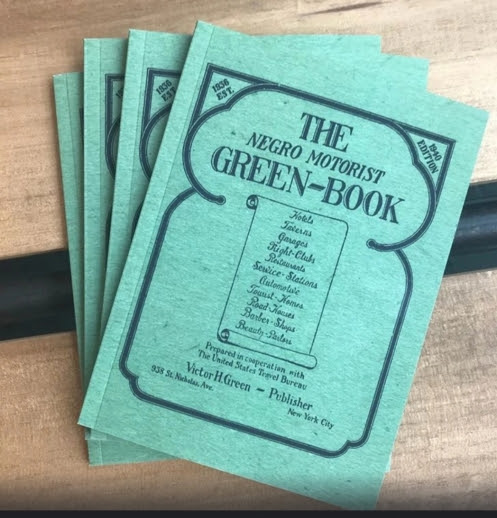
Actual Green-Book
The synopsis according to IMDB.com is: “Lovecraft Country follows Atticus Black as he joins up with his friend Letitia and his Uncle George to embark on a road trip across 1950s Jim Crow America in search of his missing father.” While this is true, it’s not the whole story. Why are they embarking on this trip? It’s to help update what many people may know as, The Negro Motorist Greenbook. Yup, just like the movie, The Greenbook. If you don’t know, this book was originated by Victor Hugo Green as a travel bible for African Americans. It provided details of safe roads to travel, places for food, repairs, and lodging where they wouldn’t be turned away or even worse, assaulted.
5. James Baldwin’s monologue on racial divide
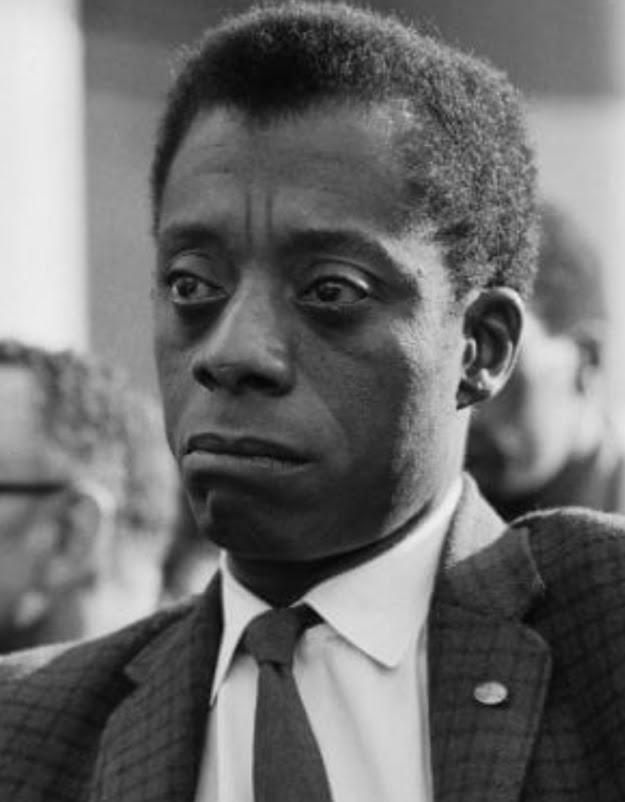
During one of the scenes in Lovecraft Country, we see a montage of our protagonist’s road trip. In the montage we see different moments where they face discrimination, others facing discrimination, and the hardships of ignorant people with all the privilege in the world monopolizing on their entitlements. Usually, during movie montages, a composer would play a score to envoke emotions during the collection of scenes. Lovecraft Country went in a different direction. Instead, they played the monologue of James Baldwin’s renowned speech at Cambridge University where he debated with William Buckley on the subject of the United States racial divide. James Baldwin was a brilliant playwright, novelist, speaker, and activist that eloquently described the plight of the black man as it still stands today. Merged with the scenes during the montage, it speaks volumes about the state of America.
6. Ice Cream stand Scene
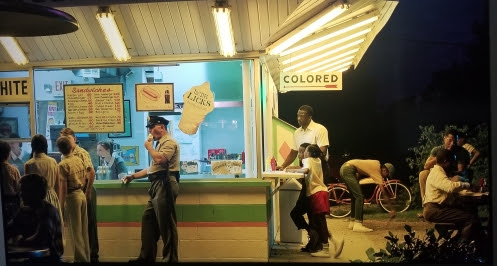
Scene from episode 1
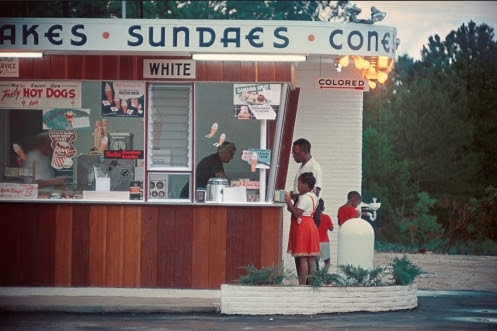
Gordon Sparks photograph
In one of the scenes in the montage, we see a black man and his children waiting at an ice cream stand for service. Right over them is a sign that says “colored” and on the other side of the stand is a group of white people with ice cream being tended to by the servers. This scene looked extremely familiar to me. When I did some research, I realized this scene was based on a famous photograph by Gordon Parks, photographer and journalist who well-documented scenes of the segregation and civil rights era. Years ago I saw his work in its full brilliant quality at the High Museum in Atlanta. The color and detail brought a realism that a black-and-white photo could never do. It made this a real thing.
7. Mother and daughter under the neon sign
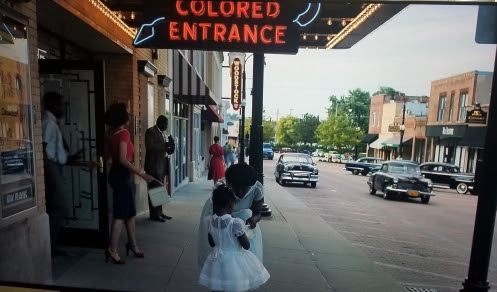
Scene from episode 1
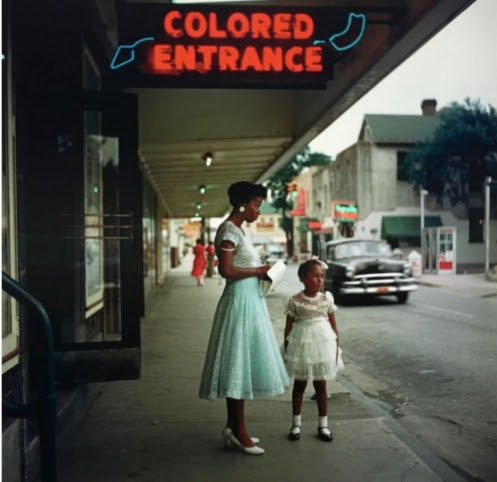
Actual photo
This scene once again pays homage to another photograph by Gordon Parks. A mother and her daughter dressed elegantly as if they were going to church, standing under a large neon sign that says ‘Colored Entrance’.
8. The billboard across from the gas station
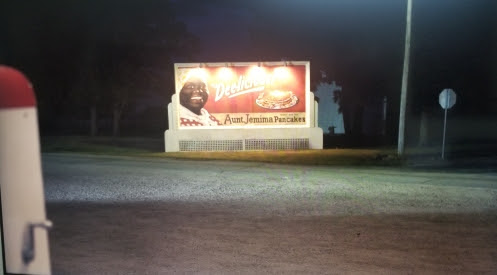
Scene from episode 1
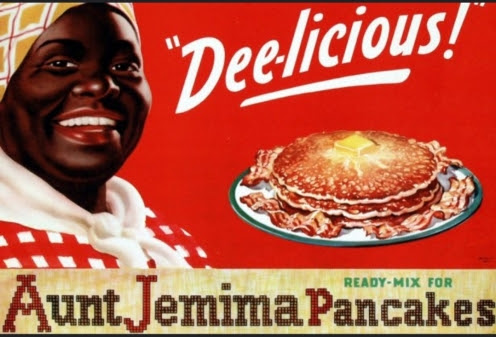
Advertisement the billboard is based on
While Atticus and company are at a gas station filling up their car, they are approached by a gas station attendant pretending to be a gorilla to mock them. Leticia holds Atticus back from approaching the man as the attendant intensifies his ignorant behavior and she forces Atticus into the car. As they pull off, you can see a Billboard for Aunt Jemima in the background. Aunt Jemima has always been a misrepresentation of black culture through the lens of the white man and advertised to his fellow man as the overall perception of black people. The image of Aunt Jemima is a source reflection of the learned behavior of the gas station attendant.
9. Sundown towns
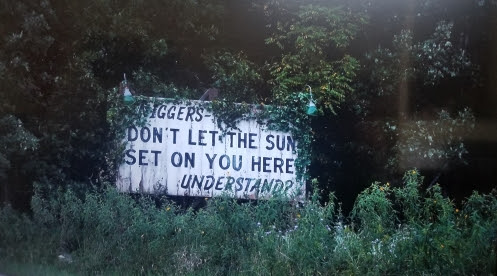
Scene from episode 1
Two years ago was the first time I’ve ever heard of a Sundown Town. No, not through a history book, but as a warning about staying too late in a little town in Texas that exists today! If I didn’t hear about this first hand, I would’ve thought it was a theme of the past, but no. There are currently county’s that do not condemn the abuse of black people once the sun goes down! While the billboard here might be a relic from the past, Sundown Towns are definitely alive and well across America!
10. White walls
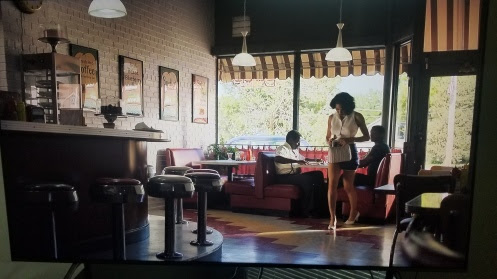
Scene from episode 1
Not only is this one telling, but it also holds all kinds of subliminal messages. While the group finds a Green book safe haven for dining called Lydia’s, they are surprised to find the restaurant is now called, Simmonsville Dinette. Still, they walk in and are greeted by unwelcoming faces. While the server goes to the back for what seems like their coffee orders, Atticus realizes that the walls are painted white. He asks his uncle to remind him why the white house was white. His uncle tells him about the war of 1812 when British soldiers torched it and when slaves were tasked to rebuild it, they had to paint it white to cover up the burn marks. This tells us two things. Lydia’s restaurant was burnt down and rebuilt by trespassers (obviously for being a safe haven for blacks in this all-white town) and the blackness of this restaurant was erased and covered up by the ‘white’ paint. My goodness, I could go on and on about this one!
I was expecting this series to be littered with easter eggs, but knowing they have incorporated easter eggs specifically about the black movement and struggles has me fired up to see what else is in store for these characters. Did you see any easter eggs that I missed? Comment and let me know.


